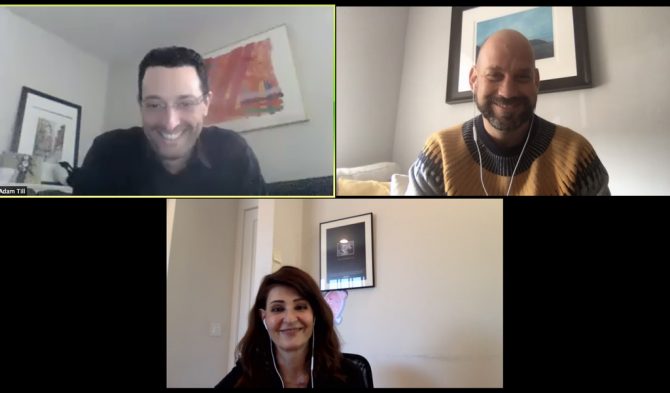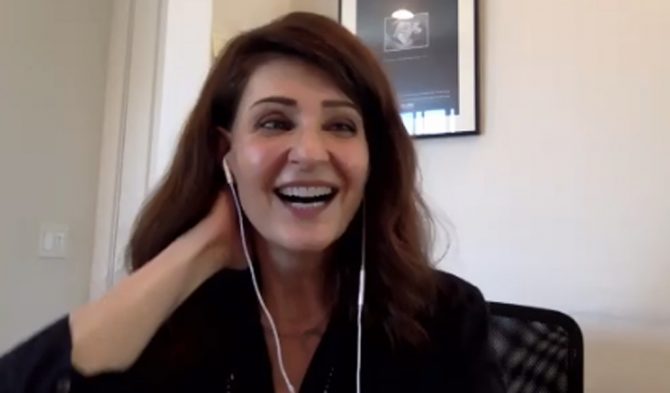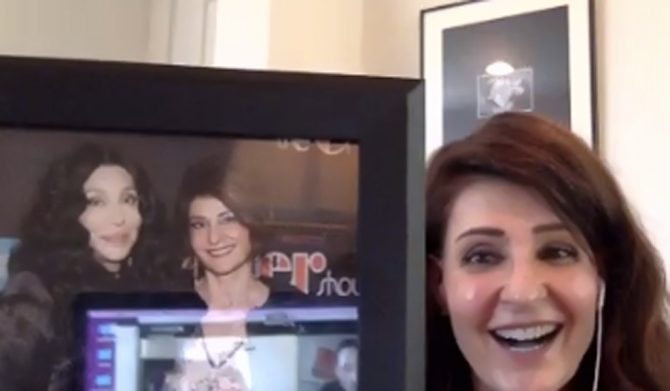Nia Vardalos’ Meteoric Rise to Fame and Critical Acclaim Inspires During Motivational ‘In Conversation’ Event
“You can’t wait for permission to be in this industry…You cannot wait for the phone to ring – I think you have to call yourself.”
That was just one of many pearls of wisdom Academy Award-nominated screenwriter, actor, director and producer Nia Vardalos shared with Toronto Film School students during her special guest appearance as part of the school’s ongoing In Conversation speaker series.
The motivational 90-minute Zoom session, hosted by Toronto Film School’s Executive Producer in Residence Andrew Barnsley and Writing for Film & TV Program Director Adam Till, covered all aspects of Vardalos’ career from her days on stage at Second City Toronto, to her meteoric rise to fame and critical acclaim with My Big Fat Greek Wedding, to her recent string of sold-out stage runs of Tiny Beautiful Things, and everything in between.
On going against her parents’ wishes to pursue her passion for acting
“The most supported children rarely have anything to prove. So, if you have ethnic parents saying ‘No, you’re not going to be a stand-up comic. No, you’re not going to be a screenwriter. No, you’re not going to be a ballerina,’ you’re going to work pretty hard…
“When I told my dad I wanted to be an actress, he said ‘Okay, you can go to school, you can learn acting, and then you can be a teacher and teach acting’…But I applied for Ryerson and when I got in, I inflated the numbers and told him: ‘Dad, a thousand kids auditioned from all across Canada and they only take 15 kids. And I’m the only Greek!’ And he was, like, ‘What???’ Haha, and then, of course, he wanted me to go. And now my parents have been in all my movies. They are hams.”

On her early days at Second City
“Really my entire career was built on just leaping and being a fearless idiot. When I was auditioning for Second City, I was at Ryerson Theatre School. I kept trying to get into Second City and I didn’t even get a callback. Someone told me if you work there, you can take the classes for free, so I took a job at the box office, took the Saturday classes for free, and learned how to improvise. And I auditioned, didn’t get a callback. Auditioned, didn’t get a callback.
“And then one night – March 29, to be exact – one of the actresses got ill and was rushed to the hospital with an inner ear infection, and the stage manager came running to the box office where I worked, and was flipping through the rolodex trying to find an understudy…When the understudy didn’t answer the phone, the stage manager was, like, ‘Ugh!’ and went backstage – and I followed her. I walked up to her backstage and I said ‘Hi, my name is Nia, I work in the box office, I am a member of Actor’s Equity and I know your show.’ The reason I knew the show so well was because I was the worst box office person at Second City ever. I would take people’s tickets, and then as soon as everyone was in the theatre, I would take the phone off the hook and go in and watch the show myself. So, I had watched it for three weeks. I knew that show.
“Having no other choice, they put me on. I did the show, and then the next day I showed up for my box-office shift, and all the producers were there, so I thought I was fired. But they hired me, instead, and I was in the cast all of a sudden. From there, they sent me to London, Ontario… then the producers from Chicago Second City came up to look at me, and they hired me to come down to Chicago.
“So, all those adages are true: Opportunity knocks. Just be ready, be ready, because you never know what’s going to happen. Even if I never got the chance to go on stage, I still had comedy coursing through me every night just by getting to watch.”
On how she came to write and launch My Big Fat Greek Wedding as a one-woman stage production after being dropped by her agent
“After five years at Second City, I moved to Los Angeles thinking I would get a TV pilot as soon as I crossed the border into California. Alas, that did not happen, so I made my living doing voiceover work and I kept trying to break into the industry, but I wasn’t getting auditions. So, I went in to talk to my agent, and I said ‘What could I be doing? Could I maybe go in and have some generals with casting directors?’ And she said, ‘Here’s the deal, I’ve been thinking about this, and you’re not pretty enough to be a leading lady, and you’re not fat enough to be a character actress.’ I just remember waiting for her to go ‘Just kidding!’ and high five me across the table, but she didn’t. She didn’t at all. She said ‘I’ve been sending out your picture, and I can’t get you an audition, because you’re not Hispanic, and you’re not really white. What are you, anyway?’ And I said, ‘I’m Greek.’ And she said, ‘Yeah, that’s the problem. There are no Greek roles.’ And then she dropped me…
“As I drove home, I thought about what she’d said was the problem: That I was Greek and there weren’t any Greek roles. So, I decided, ‘Well, I’m going to write one, then.’ So, I borrowed a friend’s computer and I wrote it…Not knowing what to do with it (when it was done), I sent it off to the Library of Congress to get it copyrighted, because I didn’t know about the Writer’s Guild or anything.
“Then, while I sort of waited, I saw (fellow Second City Chicago alum) Jeff Garlin’s stage show, I Want Someone to Eat Cheese With, and I saw Julia Sweeney’s show, God Said Ha! and those are two formats of storytelling that are not necessarily stand-up, and that’s when I thought ‘That’s what I’m going to do!’
“So, I rented a theatre with the last of my voiceover money and I jumped on stage, and I did the material from the script as a one-woman show, playing all the characters myself. There were no costumes, much in the style of Second City. The set was a typical ethnic parents’ living room that I’d gotten from the resale shop. It was a couch with lace doilies on it and some Greek bric-a-brac all over the place, and that was it. I had one single light, and I hired my stage manager from Second City for $50 a show.”

On being taken under Tom Hanks and Rita Wilson’s wings
“When the show started to sell out, it was unbelievable. I mean, I went to church and handed out fliers, and the Greeks came, and then they came back with their non-Greek neighbours. And that’s when I decided I had to push my luck a little bit. I placed an ad in the Los Angeles Times for $500 and it was little. It was an ad for the play with my home phone number on it.
“Tom Hanks and Rita Wilson, meanwhile, had just come back from New York. That morning, Rita had said, ‘Tom, let’s see some Los Angeles theatre’….and she opened the paper on the one day my ad had run, and she said ‘Oh!’ Being Greek herself, she said, ‘Let’s go see this.’ So, Rita Wilson came to the show, and she brought her mom and nieces, and she waited for me after the show. The very first thing she said to me was ‘I love you!’ and then she said, ‘This should be a movie,’ and I handed her my screenplay so fast that her hair flew back.
“She sent Tom to the very next show, then he called me and he said ‘Hey, it’s Tom Hanks. I’m forming a company with my partner Gary Goetzman, it’s called Playtone and we’d like to make your movie our first movie. And then I said the craziest thing I think I’ve ever said in my whole life, I said ‘I’m not really a writer…I’m an actor, and I’d like to play the bride.’ And he went, ‘Yeah, yeah, we’ve talked about it, you’re going to play the bride.’ And I was, like, ‘Oh my God, this guy is such a sucker’…
“I will never get used to the fact that we work together and know each other, and Rita Wilson is my fairy god-sister…they’re the greatest people. I’ll never get used to it, but at the same time, they are actually extremely normal human beings, and that’s what makes them so approachable and great.”
On leaps of faith
“What I think is indicative of the three times I’ve been happiest in my life, is when I’m, what I call, a fearless idiot. When I went on stage from the box office at Second City, when I knew Tom Hanks was in the audience and was absolutely terrified to walk out from the wings, and the third time, when I adopted my daughter from American foster care with 14 hours notice…those are the three times in my life that have lead to the three happiest experiences of my life.”
On her Academy Award nomination for the My Big Fat Greek Wedding screenplay
“I was on a huge press tour at the time. That movie didn’t close…it was in theatres for 365 days, if not longer. So, it was just wave after wave. I’d done the Tonight Show, I think, three times for the same movie, so it was just unbelievable and I was tired. I’d been nominated at that point for a Golden Globe for Best Actress and we’d been nominated for Best Comedy, so really, my cup ranneth over, so I slept in the morning of the nominations. The phone rang, and it was my best friend Kathy Greenwood, and she was crying, and in my sleep haze, I didn’t know what was happening and I got scared. I went, ‘What’s wrong?’ and she said ‘You got nominated for an Academy Award, you a**hole!’ And then call-waiting from that phone call was my parents, and then call-waiting from that call was Tom Hanks and Rita Wilson…And Tom had said very early on, ‘I think you’re going to get nominated for an Academy Award.’”
On her writing process
“I write through improvisation. I do not know where I’m going to go as I write, which means that my scripts come out big and fat and ugly and ungainly. They’re a mess. But I don’t judge it, I just get it out, write it – typos and all – and keep going, keep going. And then when it’s finished, I’ll usually go back, take a look at it, try and adjust big chunks of it. But I always print it to read it – because I believe we process information differently by turning a page. Then I put it away. I’ll go for coffee with my girlfriends, I’ll go shoe shopping if there’s a sale, I’ll do anything but look at that screenplay. Because I believe everything, like a good sauce, needs to marinate. Then I’ll go back and I’ll read the screenplay the same way, turning the pages, again. And that’s when the whole story will pop out at you. All of a sudden, you’ll go ‘Ahh! It’s not about her, it’s about the sister and it’s about the cousin’, and that’s when I’ll go back and do the rewrite, because I love rewriting. I hate writing, it’s hard. Rewriting is much, much easier. So, that’s my process.”
On lines she won’t cross when it comes to portraying her family on screen
“First of all, everyone’s funny in my family. Everyone. I don’t know why I’m the only person in my family who gets paid to do it, because it is honestly a super funny family. And we’re not mean. None of us are mean humour, we will joke and poke at each other and be super funny. So, they take it really well and they’ve been to all my premieres…
“However, yes, there are things that I will not put into my screenplays. My mom reads all my screenplays that are about my family and we discuss things to make sure that I haven’t crossed the line. One of the things I did not do, which I can talk about now, is, the night before my wedding, my cousin came out, because he knew it was the perfect time. In all the pandemonium of the wedding, he came out and…none of the older Greek parents freaked out, it was great. It was ingenious. But I didn’t put that into my (My Big Fat Greek Wedding) movie, because that’s not my story to tell. It’s his story. So, that’s an example.”

On when she knew she wanted to pursue a career in show business
“This is another name drop, but I’m just going to say it: I’m friends with Cher. I’m just going to hold there. It’s crazy, right? And one of the things that she said that really, really stayed with me is that she always knew she was going to be famous, which is an amazing thing to say, right? She always knew. She knew she could sing. Her mom was hugely supportive of her, but how did she know she was going to be, not just successful, but famous? I didn’t have that.
“What I did know is I that I wanted to act. And if I’d stayed in Winnipeg and done Rainbow Stage and the Manitoba Theatre Centre, I would’ve been super happy. Really happy. It doesn’t matter the level of the playing field. It does not matter.
“If you are in this film school and ultimately you decide you want to be a baker who writes screenplays or does community theatre on the side, and you get that itch scratched, that’s still a life fulfilled. I’m equally happy as when I was at Rainbow Stage doing Kismet. I’m a theatre geek. I’m just happy when I’m making something, creating something.”
On how feeling ‘othered’ can lead to great comedy
“I think anybody who’s a little bit brown, like me, we felt like we didn’t fit in…Being othered, while painful at the time, leads to great comedy. And I think Russell Peters grew up the same way, the way his parents were so strict. All of that is horrifying and makes you so mad at the time, but it’s great to laugh at later. And I wonder now about the trans community, and I wonder now about being marginalized if you are gay, or if you are in any way feeling like you’re outside of society. I do think that that lends itself to great stories.”
On identifying opportunity and seizing upon it
“You cannot wait for permission to be in this industry and you cannot wait for the phone to ring – you have to make that call yourself. There are more opportunities than ever now, in that we have iPhones, we can film things, and we can put them on YouTube, or any form from Instagram to Snapchat, to anywhere else you can just be creative and you can make a name for yourself.
“But if fame is the goal, you’re creatively dead, and please don’t. But if being creative is important to you, then you can do it – you don’t have to wait for the opportunity to get hired. I did not make a living, for a really long time, being an actor, but I still called myself an actor.”


